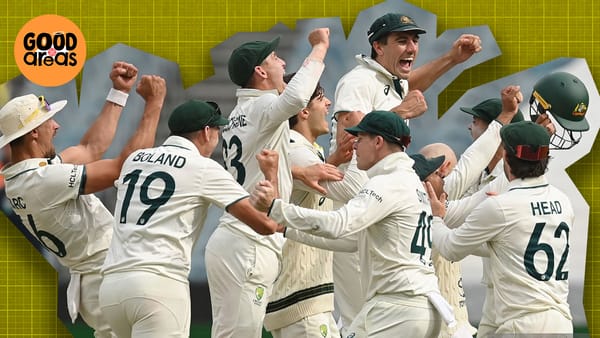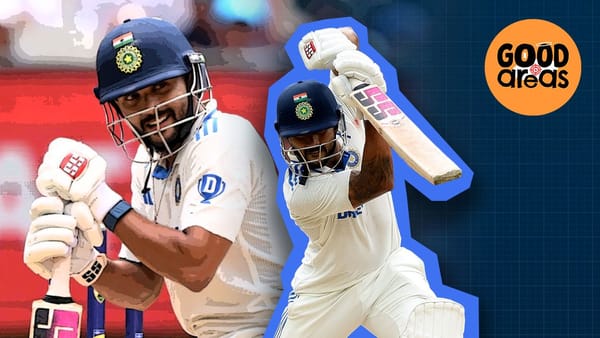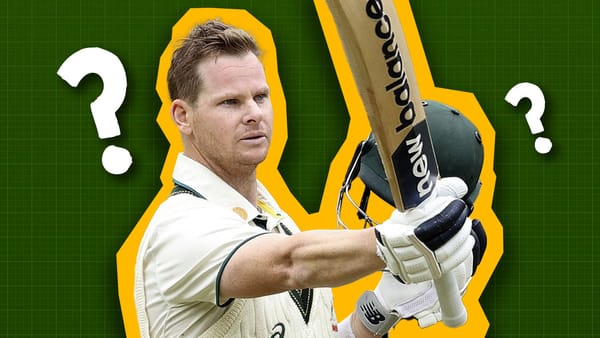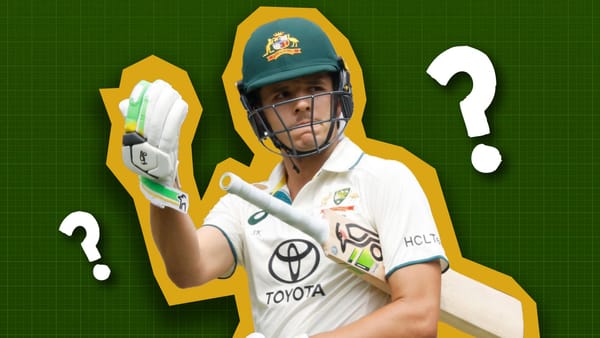The birth of Test Cricket
Let's go way back to the beginning.
Double Century is my podcast on the history of cricket. Many people have asked for the transcripts, so here is episode one from the first season. It's on the beginning of Tests. Which involved betting, jail and a journalist deciding the whole thing was worthy.
Australia won the first Test by 45 runs. Nine of those runs came from England byes, maybe it didn't make a difference, but England would have chosen another keeper if they could.
Ted Pooley was supposed to be their man; instead, he was awaiting trial in Christchurch.
Ted Pooley was never a straightforward guy. He died twice, once when the papers decided he'd passed from Liver Cancer. It turned out they were wrong. Pooley was a proper player, starting as a bowler who attacked a bit with the bat. He convinced a captain to let him keep, and he'd be one of the best in that position during his time. He once took 12 dismissals with the gloves; four were stumpings. He started his career shaving off some years from his birth certificate so that Surrey would notice him. Another time he got drunk at lunch on a bottle of champagne he won from another player in a bet. There were rumours that money had also changed hands; either way Surrey used a more sober keeper after lunch. He was once suspected of throwing a match. He liked three things, gambling, drinking and keeping. Or as Wisden once put it, "The faults of private character that marred Pooley's career and were the cause of the poverty in which he spent the later years of his life there is no need now to speak. He was in many ways his own enemy, but even to the last, he had a geniality and sense of humour that to a certain extent condoned his weaknesses."
It was his work with the gloves that got him on the boat. In 370 first class matches he made one hundred. He was known for aggressive counter innings, but they rarely lasted long, Thought his greatest might have been the 93 he made with a broken finger. He was tough, nuggety, kind of the prototype for what wicket keepers would become. He could throw the bat, was great up at the stumps and cheeky. It's just his cheeky was bordering on criminal and he'd certainly have found himself suspended under current match-fixing regulations.
If Pooley seems a weird fit for English cricket, of which you are probably visualising tea and cucumber sandwiches, you need to readjust your framework. Cricket started as a street game, then Hambledon came along and set up very strict laws how it could be played so they could bet on it easier. Cricket wasn't just the first international sport - it was the begging of modern sport. They built fences to ensure people had to pay, charged extra when WG Grace played and the whole thing, even the amateur side of it, was a business. They just didn't term it that way. The reason England toured Australia in the first place was to make money. And before they got to OZ, they were in New Zealand. There the newspapers printed the odds and daily cricket writing included talk of the bets made. The first occasion of match fixing in cricket came almost 50 years before this. People have always wanted money, who knew.
Ted Pooley wanted to make cash more than most. In one match in Christchurch, Pooley was missing with an injury, so he headed over to make some bets from Ralph Donkin, a railway engineer who was not a professional bookmaker. Donkin offered odds on the exact score of each batsman, Pooley being a smart bloke, bet on all the batsmen to make ducks, knowing that in a game like this there would be more than enough to make his money. The Canterbury team consisted of 25 players, which was also very common at the time, as most teams from England were seen as so much better that the only way to make it competitive was to have more players on the opposition. More ordinary players meant Pooley's bets on ducks was a pretty solid idea.
Ofcourse we should also add that he would umpire in the match, so um, that may have been one of those conflicts of interests you hear about. The truly mad thing is that no one suggested that Pooley had cheated with his umpiring, but there were 11 ducks which pocketed Pooley 36 quid, which according to the random inflation calculator I just googled means that he made around 4200 quid in today's money. That's probably a few weeks of wages for him, and he's from Surrey, so he was probably overpaid to begin with.
At this point, he hadn't actually committed a crime, but something went on when he tried to pick up his winnings. It resulted in him and Donkin the bookmaker having a physical altercation, which is the nice way of saying Pooley kicked his arse. He punched him three times in the face and also apparently torn his clothes to shreds.
The fight seems to have stemmed from Donkin feeling like he was ripped off from Pooley. Which I suppose he was, but maybe he wasn't cut out to be a bookmaker, y' know. Pooley took his winnings and moved on with the tour. The team moved to Dunedin, but it was there that Pooley was arrested and brought back to Christchurch. Pooley then had more bad luck; he wasn't done for match fixing, he was fined five pounds for the attack on Donkin the bookmaker, which was fine, he was still well up. But Pooley was charged with wilfully and maliciously destroying the bookmakers property and for that he had to await trial.
Sadly for Pooley, one witness had caught the boat to Melbourne, so he had to wait for him to return. The witness never returned, and so eventually the trial went ahead. There seemed to be little proof that Pooley had damaged any property, and it took the jury less than an hour to find him not guilty. The locals of Christchurch felt so bad for Pooley he was sent on his way with 50 pounds from a local whip around, and a gold ring. It was while Pooley was awaiting trial that he missed the first Test.
This was an extraordinary match for the first. The Australian batsman Charles Bannerman opened up, and he was English born. Sorry to those who still moan about this, but it's just how cricket rolls. Bannerman faced the first ball, scored the first run, made the first 50, first 100, first 150 and then was the first batsman to retire hurt. He also still holds a record, no batsman in the game's history has scored a larger percentage of the runs in a completed innings than Bannerman. He made 165 out of 245, Harry Jupp made the second highest score of 63 in the match.
So right now you're thinking, this Bannerman is some player, but that was his only first class hundred, he played two more Tests, ended up as umpire and wasn't even the best player in his family. That would be Alec Bannerman. Bannerman averaged 15 over his next five years in first class cricket, and no one is sure why, Some wrote of drink and gambling, but he just became the ghost once known as Bannerman, who ended up as a bookmaker - while he was still umpiring. In 1891 he was taken to court to answer on charges of deserting his wife, when he was asked how he made his money he said, By cricketing, your worship. Sadly after that it was by other means.
England had to play after a travel day, and they probably spent less time in the business class lounge than most modern teams. At this point no one really rated Australian cricket, teams had been touring Australia from England since the 1850s. This squad was tired from playing too much cricket - where have I heard that before -, several of them had been seasick on the journey over from New Zealand and they had James Southerton who was 49 years old. With all that it wasn't surprising that England replied with only 196, Billy Midwinter, who played for Australia and England - are you sensing a theme here - took 5/78. Australia collapsed to 104 in the third innings. Alfred Shaw, who finished his career with 2000 first class wickets took 5/38.
This meant England needed 154 to win. They fell to 22/4, had a 40 run partnership, but left armer Tom Kendall - born in England, seriously this happened a lot - took 7/55 for Australia to win the game. It was seen as massive in Australia, a country in the arse end of nowhere that was still working out what it was, and still wasn't united in a federation, just a collection of states on a big arse island. One Australian newspaper wrote, "It shows that in bone as muscle, activity, athletic vigour, and success in field sports, the Englishmen born in Australia do not fall short of the Englishmen born in Surrey or Yorkshire". It's much different from the gloating you hear these days.
So there you have it, the best of Australia beat a full strength England and Ted Pooley missed a chance to play in the first Test. Except to use a Luke Skywalker phrase from unarguably the best Star Wars film, "Every word of what you just said was wrong." Australia did not beat England; the Combined Australia XI defeated Lillywhite's XI. WG Grace and Fred Spofforth didn't play, Spofforth sitting out because his mate was not chosen as wicketkeeper. Grace wasn't on the tour, none of the Graces were, as Lillywhite's tour was for professional players, not gentlemen.
We think of Test cricket as this international endeavour, with selection committees looking for the best players in their country. This was a match between professional team and a Combined Australia XI from a place the wasn't weren't even a nation yet, Lillywhite wasn't even representing Lord's, he was just a good cricketer. How good, 1200 wickets at 15 and two first class hundreds. He came from a famous family of cricketers and had toured Australia and even the US before this tour came about. Lillywhite - who had his own version of Wisden - the James Lillywhite's Cricketers' Annual was a well known and respected person in cricket. And so he wanted to make some more money by creating a tour. He selected a bunch of professional players because of trouble he'd had with the gentlemen on his previous tour of Australia. This wasn't a real tour of cricket as we know it, regularly Lillywhite's XI would play against teams of over 11 players, they rarely had a day off, they either travelled or played. This was a chance for professional English cricketers to make money in their off season.
This game was not advertised as an international, if Lillywhite wasn't mentioned it was called All England XI versus Australian players. And perhaps the most important thing to note was this wasn't the first Test. Large cricket matches had used that title since the 1850s. There was no governing body, there were just cricket boards, grounds and promoters trying to get bums on seats, and that word seemed to help them do that. If you were running a large match, and you had a touring team, and a few star players, just slap Test on it and hope a few extra people would come. To show how little sway this match had at the time, when Fred Spofforth pulled out, his replacement was Frank Allen. He also didn't play, because he was attending a local fair instead.
So how did this random cricket match become a Test match, enter Clarence Moody, perhaps the most important man in Test cricket you've never heard of. Moody was a South Australian cricket writer. In 1894 Clarence Moody wrote a book called South Australian Cricket, it was republished after that, and in it he made a list of what he decided to be real Tests. Moody wrote under the blogging handle - although this was a minute or two before blogs - of "Point". And this was like a blogging exercise, I mean it's partially a listicle, I think Moody still works for BuzzFeed. This list by this random writer in Adelaide with no affiliation to either of the MCCs, Melbourne or Lord's, wrote up what became the official list of Tests. The bloke just wrote a book, and they turned the book into cricket canon.
There are probably a bunch of reasons this became official. One was that he was hard; he poured over the quality of teams looking for what he thought was Test match worthy. He wasn't a homer either; he overlooked Australia's win versus the MCC in 1878 because he didn't think the MCC team was strong enough - WG Grace played in that.
And it was a fairly exhaustive list of the best matches ever played, and as Gideon Haigh once wrote, "the absence of anything better" lead to this being the list.
So Test cricket started with a match fixing scandal, the best players not wanting to play or not making the tour, a bunch h of professionals making their own way and a writer deciding the whole thing was legit. It was from this that our game was born, kicking, screaming and puking all over the place.
Ted Pooley's career slid after that series, and he became bankrupt. He died for a second time and final time in the Lambeth infirmary. This time paralysis and complications did him in. He played 370 first class matches and made 9345 runs. In one match he took eight catches and four stumpings. Pooley never played a Test.
This podcast is brought to you by our supporters at Patreon, if you like what you read here, please help out if you can.
This is epsiode one of season one of Double Century.
Our fact-checkers for this episode are Bertie Moores and Abhishek Mukerjee.
This podcast is edited, mixed and produced by Nick McCorriston.
If you want to actually listen to me speak in a podcast, here is a new episode of Red Inker where we talk about Meg Lanning.




